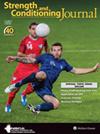全国大学生体育协会女子足球运动员监测项目的证据与应用:叙述性综述
IF 3
4区 医学
Q2 SPORT SCIENCES
引用次数: 8
摘要
摘要:美国国家大学生体育协会(NCAA)女子足球运动员在季前赛中要花2-3周的时间,然后在竞技赛季中要花12-14周的时间。由于季前赛时间短、激烈,随后是漫长的比赛季,在NCAA第一赛区大学女子足球比赛季期间,运动员监测项目将在最大限度地提高身体准备和比赛表现,同时最大限度地减少不利的适应和疲劳方面发挥重要作用。运动员监测措施可用于评估训练负荷(TL)、对TL的反应,以及运动员在竞技赛季训练或比赛的身体和心理准备情况。感知用力的会话评分和全球导航卫星系统测量是常见的负荷监测措施,而主观恢复和压力问卷、心率测量、性能测试和生物化学测量是评估TL反应的监测措施。本文旨在回顾这些运动员监测措施的作用,并提供女子足球比赛中对身体表现的要求和运动员监测策略。此外,本文还提供了基于NCAA第一赛区女子足球比赛时间表和限制的运动员监测项目的从业者示例。本文章由计算机程序翻译,如有差异,请以英文原文为准。
Evidence and Application of Athlete Monitoring Programs in National Collegiate Athletic Association Women's Soccer: A Narrative Review
ABSTRACT National Collegiate Athletic Association (NCAA) women's soccer players spend 2–3 weeks in preseason, followed by 12–14 weeks in the competitive season. Because of a short, intense preseason followed by the long competitive season, athlete monitoring programs would play an important role in maximizing physical preparation and match performance while minimizing unfavorable adaptations and fatigue during the NCAA Division I collegiate women's soccer competitive season. Athlete monitoring measures can be used to assess training load (TL), the response to TL, and a player's physical and psychological readiness to train or play during the competitive season. Session rating of perceived exertion and global navigation satellite system measures are common load monitoring measures, whereas subjective recovery and stress questionnaires, heart rate measures, performance tests, and biochemical measures are monitoring measures to estimate the response to TL. This article aims to review the roles of these athlete monitoring measures and provide the physical performance demands of women's soccer match play and athlete monitoring strategies. Furthermore, this article provides practitioner examples of athlete monitoring programs based on NCAA Division I women's soccer match schedules and limitations.
求助全文
通过发布文献求助,成功后即可免费获取论文全文。
去求助
来源期刊

Strength and Conditioning Journal
社会科学-运动科学
CiteScore
4.70
自引率
8.00%
发文量
49
审稿时长
6-12 weeks
期刊介绍:
Strength and Conditioning Journal is the professional journal for strength coaches, personal trainers, physical therapists, athletic trainers, and other health professionals working in the strength and conditioning field. The journal’s mission is to publish articles that report both the practical applications of research findings and the knowledge gained by experienced professionals.
 求助内容:
求助内容: 应助结果提醒方式:
应助结果提醒方式:


